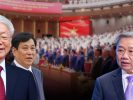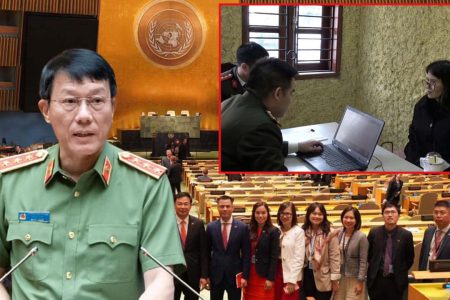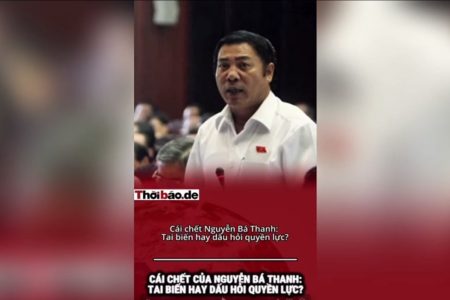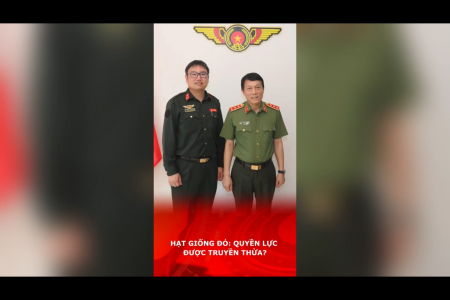What is this time talking about „strategic trust“ between China and Vietnam, if not flashy lies? Leaders of two „fake“ communist countries are racing to play a cheap play. The conflict was at its height but the lines were all lulling and full of magic …

What „strategic trust“?
On April 26, 2021, receiving Chinese Defense Minister Wei Fenghe at the Presidential Palace in Hanoi, President Nguyen Xuan Phuc called on the Vietnamese and Chinese armies to strengthen confidence-building amid rising tensions in the South China Sea (Vietnamese call it the East Sea).
Speaking to Senior Lieutenant General Wei, who is on an official visit to Vietnam on April 24-27, Mr. Phuc wished the two armies to continue to build firmly „strategic trust“ and the bilateral cooperation in defense continues to be the pillar in the relationship between the two countries.
At the present time but talking about „strategic trust“ between China and Vietnam, what if those are not flashy lies? The question is, why did the leaders of the two „fake“ communist countries decide to play that cheap play, while the conflict is nearing its climax, but the „dialogue“ is full of magic? Who do they show it to and what is the ultimate goal of the tranquilizers here?
Not far from here, just as Gen. Wei was preparing to go to Vietnam to conduct the so-called „friendly exchange,“ the Chinese magazine „Naval and Merchant Ships“ denounced Vietnam to build a civil force to challenge Beijing. The article states: “The Vietnam Maritime Militia and their activities in the waters near Hainan Island, the Paracels, and Spratlys [Hoang Sa and Truong Sa in Vietnamese, respectively] threaten the enforcement of maritime laws and national defense security of China.“ The author issued a warning that it is necessary to seriously consider and respond promptly to the tactic that the Chinese side thinks Hanoi „learned“ from Beijing.
And yet, observers have also analyzed the most recent development, that is, China let about 200 marine militia ships anchored for a long time, from March to April this year, in Whitsun Reef of Spratlys. This action, once again, raises up old conflicts and potential new ones. According to experts, Whitsun Reef is located within the territorial sea of Grierson Reef controlled by Hanoi, that is, under the sovereignty of Vietnam. Meanwhile, the Chinese side always considers everything within the „cow’s tongue line“ to belong to them.
Clearly, the relations between Vietnam and China are increasingly difficult to resolve, especially in the issue of sovereignty over the sea and islands that China once took from Vietnam. The South China Sea disputes are publicly shown in the 7th „Defense Strategic Dialogue“ at the 7th level of Vietnam-China Deputy Minister taking place in Dong Hung city on April 23. At this event, Deputy Minister Hoang Xuan Chien affirmed:
„The South China Sea is the lifeblood of the world, not only having strategic value in terms of economic, trade and defense-security but also geopolitical strategic value. So Concerned parties need to actively cooperate, maintain peace and stability in order to bring about common interests.“
During the same period of „friendship activities“ between the two countries‘ military officials, China continued to make notable moves at sea, when its aircraft carriers were found to be marching toward the South China Sea. On April 23 last week, President Xi Jinping attended the staffing ceremony of three new warships at the Sanya Naval base on Hainan Island. Among the new ships, there is notably the Type 075 amphibious ship capable of carrying 30 helicopters and hundreds of troops. These vessels are expected to operate in the South China Sea in the near future.
„War language“ diplomacy met „swing“ diplomacy
Earlier, in the middle of last April, the new Vietnamese Foreign Minister Bui Thanh Son also had a telephone call with his Chinese counterpart, State Commissioner and Foreign Minister Wang Yi, in which the two sides were frankly exchanged on maritime issues, although it still affirmed to maintain the relationship „comprehensive strategic cooperation.“ But each side’s narrative on the content of the radio reveals a few different points.
Wang, the father of „war language“ diplomacy, stressed that “both countries are attached to the leadership of the communist parties, as well as the socialist path “ and repeated that neither he nor Vietnam believed: “As comrades and brothers, China will continue to commit to supporting Vietnam to follow the socialist path, for a good future. (When Vietnam becomes a district of China?)
Wang did not forget to remind his Vietnamese counterpart of his spiritual mission: “Faced with rare changes in the past century, the two sides need to remember their original mission, which is to reinforce trust and confidence. solidarity, strengthen strategic cooperation and protect common interests. This not only helps preserve the political security of the two countries and adds a strong impetus to the socialist ideal of the world … “
New Foreign Minister Bui Thanh Son, a descendant of „lie“ diplomacy, does not seem to mention much about the „socialist path“ but focuses on emphasizing South China Sea issues. While Wang, according to Chinese media, used the phrase „to properly handle matters at sea,“ the Vietnamese media wrote quite carefully about Hanoi’s request in how to resolve the dispute: „The two sides have a sincere and frank exchange on the sea issue, agreeing to continue promoting the role of the current negotiation mechanisms.“
Minister Bui Thanh Son suggested the two sides exchange and resolve disagreements in the spirit of respect for each other’s legitimate rights and interests, mutual agreement and understanding between the two sides, and international law, including the United Nations Convention on the Law of the Sea, and ASEAN made positive progress on the Code of Conduct in the South China Sea. Wang was obviously “bluffing” these legal aspects.
From the first phone call between the two FMs, it was quite clear that China continued to want to force Vietnam into the carriage of socialism, despite its complete collapse from a world-system perspective. Through the „bridesmaid battle,“ both the Cold War and the Hot War, the Vietnamese diplomacy awakened to the „ideological“ cake that Beijing has always tried to stuff into the party’s menu.
Can’t get people out of „game“
Entering this year 2021, due to the unpredictable fluctuations of the COVID-19 pandemic and the global rivalries between regional and international power networks, Vietnamese leaders begin to realize reality. Removing people from the „game“ in the Vietnam-China relations is a deadly trick. Therefore, it seems that from the beginning of the year until now, Vietnam has started to give green light to allow people to commemorate the event of the conflict at the Gac Ma (South Johnson Reef) on March 14, 1988, in which Chinese warships opened fire and killed 64 Vietnamese soldiers.
If in the past, each occasion commemorated tragic events in Vietnam-China relations, from the border war (February 17, 1979) to the coercion of the islands and islands of Vietnam (from Paracels attack on January 19, 1974, to the Gac Ma massacre, March 14, 1988), the government almost banned all forms of rituals. So illogical that many brothers and sisters in civil society were persecuted and imprisoned just for carrying the banners „Hoang Sa-Truong Sa-Vietnam.“ The state has removed the steles of Chinese crimes in the northern border provinces. Instead of acting in practice to protect the sovereignty of the islands, they distributed thousands of flags to the fishermen.
Perhaps there has never been a time when the government was ashamed of being „cowardly to the enemy while evil to the people“ like the years when the Party and the State straightforwardly suppressed civil society in a „chainsaw and deception“ with China. Many times, people do not understand what the Vietnamese regime wants, when they cannot be suppressed, they are organized to destroy the mob. Right on the memorial days, the government allowed the force of „public opinion shapers“ to organize dances on ludicrous music at Ly Thai To Monument in the center of the Hanoi capital.
Returning to the recent „Vietnam-China friendship exchange,“ surely the US and the West could not help but be surprised when they heard President Nguyen Xuan Phuc speak to Defense Minister Wei at the Presidential Palace on April 26, that, “Vietnam opposes any force that interferes with China’s internal affairs. We will be vigilant and determined against all attempts to undermine China-Vietnam relations and will never follow in the footsteps of other countries against China.”
The media in the country, including the VNA, did not publish the above-mentioned content. That quote was taken from an essay in the Global Times, the English version of China’s People’s Daily [2]. If Global Times did not lie, President Phuc’s statement is worrying. Is he confused, misrepresented, or exactly is he „stepping down“ the Vietnamese boat? We need to check! But if that is true, is the new President of the state ending an end to Hanoi’s „swinging“ diplomacy?
Thoibao.de (Translated)


























